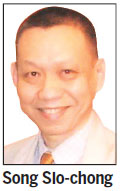Arduous constitutional reform journey begins
Updated: 2014-07-21 05:38
By Song Sio-Chong(HK Edition)
|
|||||||||
Articles 45 and 68 of the Basic Law stipulate that the methods for selecting the Chief Executive (CE) and forming the Legislative Council (LegCo) should be "in accordance with the principle of gradual and orderly progress". Recently I have observed some "gradual and orderly progress" in this area. Chief Executive Leung Chun-ying and Chief Secretary for Administration Carrie Lam have submitted their reports on the CE election in 2017 and the LegCo election in 2016. Our officials deserve praise for their hard work over the past few months. But it is just the beginning of our arduous journey in constitutional reform. In my opinion, there are a number of issues we need to watch carefully.
First, with submission of the CE's report to the Standing Committee of the National People's Congress (NPCSC) on whether there is a need to amend the two election methods, the "five-step procedure" of constitutional reform has officially been initiated. The next four steps of the "five-step procedure" are: its determination by the NPCSC, LegCo's endorsement of it (by a two-thirds majority), the CE's consent, and the NPCSC's approval.
Paragraph 5.14 of the public consultation report states that "after the CE has made a report to the NPCSC the HKSAR Government would launch a second round public consultation". There is an important caveat here: The second round public consultation does not concern the NPCSC's determination in the second step. By virtue of Article 67(2) of the Constitution of the People's Republic of China, the NPCSC has the power "to enact and amend statutes with the exception of those which should be enacted by the National People's Congress".

Issues which have not yet been addressed in the first round of the public consultation can be discussed in the second round. One of these is the tenure of the Nominating Committee (NC). Article 46 of the Basic Law states that the CE's term of office is five years, but it does not define the term of the NC. It would be good to have tenures for the CE and the NC tied to each other. The NC should have tenure of five years, following past arrangements for the Election Committee. Clarifying the NC's term of office will help prevent the sort of confusion Hong Kong experienced in 2005 when Tung Chee-hwa resigned.
The second issue is more convoluted and may require consultation. Currently, an electoral candidate is empowered to challenge election results by means of an election petition or a judicial review. A famous Hong Kong case was that of Peter Charles Mok v Tam Wai-ho (2012) 15 HKCFAR 489. Regarding CE elections, it is likely these tedious exercises will drag on for months. The State Council might have already appointed the originally elected CE. But if the court were to subsequently rule in favor of the complainant and declare the election result void, the judgment would effectively run against the central government's appointment. A potential solution is to have such petitions or judicial reviews permanently stayed following the State Council's appointment. To ensure justice is served, these proceedings should be given priority and expedited.
In addition, the Hong Kong government should consult the public on amendments to domestic election ordinances. Paragraph 5.06 of the report of the first round of public consultation states that "the mainstream opinion is that the CE should be a person who 'Loves the Country and Loves Hong Kong'", and that "the relevant provisions in the Basic Law have already adequately reflected such requirement". Stipulating this prerequisite in the Chief Executive Election Ordinance (Cap 569) reinforces the relevant provisions of the Basic Law.
I agree with the public consultation report that amendments to the election method for LegCo are not necessary at a constitutional level. However, I think we should amend the Legislative Council Ordinance (Cap 542). In paragraph 4.24 of the report, there are nine seats in the New Territories East and the New Territories West, respectively. It is recommended that these two giant constituencies be split into four. This is to better reflect the characteristics of a proportional representation system. Then, the more aggressive opposition members, having only minority support, will probably find it harder to gain LegCo seats.
The author is a HK veteran commentator and professor at the Research Center of Hong Kong and Macao Basic Law, Shenzhen University.
(HK Edition 07/21/2014 page9)